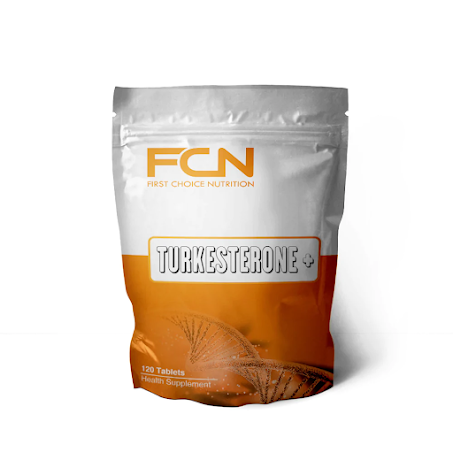What is Turkesterone and how may it help me gain muscle?
Turkesterone
is an ecdysteroid, which is a type of chemical that acts as a growth factor in
plants and insects. Consider ecdysteroids to be a type of hormone that promotes
cellular development. They control molting, growth, and morphogenesis in
insects. They repel predators in plants. They may also promote muscle protein
synthesis in mammals. For this effect, several paths have been proposed:
First,
turkesterone has been shown in in vitro tests to boost the efficiency of muscle
protein synthesis by more than 100%. (and increasing rat grip strength in
vivo).
Second,
turkesterone may enhance the amount of leucine incorporated by a particular
cell. You may recall that leucine is the most anabolic amino acid available.
Finally,
ecdysteroids such as turkesterone may bind to the beta-type estrogen receptor,
which is linked to increased bone and muscular growth rather than the more
stereotypical "feminizing" effects of other estrogen receptor types.
Are Turkesterone
Supplements Effective?
It's
difficult to say. Although there have been few human trials on turkesterone
supplementation, there have been some excellent animal studies on turkesterone
and related ecdysteroids. Consider the following:
Despite
no changes in training/swimming volume, rats given ecdysteroids were stronger
and longer swimmers than rats given a placebo.
Sheep
given the supplement gained weight more quickly and produced more wool. This
shows that it is more than just a stimulator of raw mass gain; it also improves
the organism's function (wool production). Furthermore, turkesterone had an
even larger effect on sheep who were not supplied enough grain.
An
earlier Russian study discovered that turkesterone boosted muscle protein
synthesis in the liver about as much as anabolic steroids.
Turkesterone
also appears to boost the resistance of mice subjected to "immobility
stress"—the restriction of unrestricted movement in lab mice. This is the
most consistent approach to elicit a stress response in mice. Immobility stress
causes the adrenal glands to expand, the immune system to weaken, cholesterol
and vitamin C levels to diminish, and the gut lining to degenerate in normal
mice. These alterations do not occur as soon in mice given turkesterone (or at
all).
In the absence of human studies, what can we learn from
animal studies?
Human
research begins with animal studies. We all have identical processes for muscle
acquisition, growth, and loss as animals. To be sure, there are distinctions,
but there are also many similarities and redundancies.
Anecdotal
reports from turkesterone users on internet message boards and social media are
also plentiful. You can't base public health policy or publish studies on
anonymous Reddit reports, but you can read them for yourself and decide whether
or not they're believable. Then you can decide whether or not to try the
supplement.
And,
if you look back at previous Russian studies, you'll notice some remarkable findings.
Unfortunately, I am unable to verify them. They are all unavailable as whole
studies or even abstracts, and even if they were, they would be in Russian. All
I saw was an unverified list of the results. Nonetheless, here they are:
Anti-anxiety
Wound
healing has been improved.
Reduce
blood glucose levels
Inflammation
has been reduced.
Adaptogenic
properties
Anti-arrhythmia
In
other words, these compounds are said to perform all of the "Good
Stuff" that you look for in a supplement. That could be the case, but I
can't confirm it.
Is Turkesterone a natural hormone?
Turkesterone
is a naturally occurring ecdysteroid found mostly in the plant Ajuga
Turkestanica. This plant is the source of all commercial turkesterone
supplements. They are plant extracts that are just as "natural" as
any other plant extract you would take.
Is There a Negative Side
Effect ofTurkesterone?
Common
(though not guaranteed) adverse effects include nausea, diarrhea, and upset
stomach, frequently at higher doses than suggested.
Fortunately,
turkesterone looks to be exceedingly safe and non-toxic even at high levels.
The majority of research suggest that benefits begin around 10 mg per kilogram
of bodyweight, while oral toxicity emerges above 9000 mg per kilogram of
bodyweight. There is no danger in taking anything close to 9000 mg, let alone
9000 mg per kilogram of bodyweight.
Overall,
if you can afford turkesterone, are interested in growing lean mass (or any of
the other potential benefits), and are already exercising hard, eating well,
sleeping enough, and doing everything else you're supposed to be doing, I'd
give it a month's trial. Try to keep everything else consistent—diet, training,
sleep, and stress—so you can isolate any supplement effects.
But
if you're barely training, staying up late, and eating poorly, don't expect
turkesterone to help you. Only attempt it if you're already doing everything
correctly.
If
research on anabolism in animals on reduced calorie intakes are any indication,
turkesterone may also be beneficial for retaining or even building muscle when
cutting weight.
It
appears to be promising to me. The primary disadvantage is that it is not
inexpensive, and it is difficult to obtain high-quality turkesterone that you
can rely on. These appear to be the best products available: True Nutrition,
Gorilla Mind
Do
you have any personal experience with turkesterone? I'd love to know how it
went — or didn't go — for you.
If
you are looking to buy turkesterone in AustraliaFCN
has you covered.
For more information to visit here https://fcn-shop.com
#Alcar #AlphaGPC
#DHEA #GinkgoBiloba #KoreanGinseng #SawPalmetto #NAC #Turkesterone #Zma
#Hornygoatweed




Comments
Post a Comment